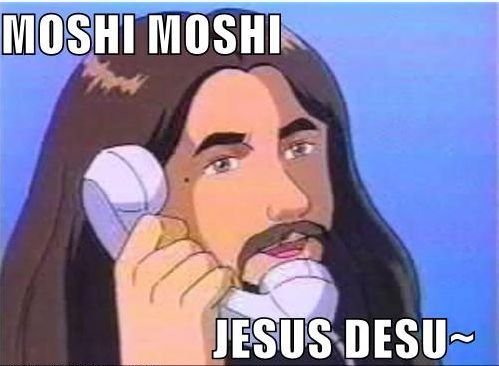Huevos de Oro
Member
KANCHO!
For all of you in this thread. I am Steel-sama. Baka gaffers.
For all of you in this thread. I am Steel-sama. Baka gaffers.
-san
Sempei
Sensai
-chan
-kun
Etc
Ect
I'm playing Persona 4 The Golden and I see a whole bunch of honorifics and I really don't know what to think of them. Do some show who is inherently the leader? Are they gender specific? Can one go from a -San to a -kun? Sometimes the honorific seems given out of respect, other times it's almost done to mock the person. I'd love to know more.
I know I could google all this but I thought I would get more subtle and specific answers asking GAF.
What about -nyan?
Only used by kittycats-nyaWhat about -nyan?
Etc
Ect
I don't think I've come across Baka before. ?
Don't be a baka aho!I don't think I've come across Baka before. ?
I don't think I've come across Baka before. ?
I just can't..why would an english translation include Japanese honorifics.
This thread will not be complete without DESU or its penultimate version, DESU-LTIMATE:
https://www.youtube.com/watch?v=FkVYHUMCCwc

To be better immersed in my own kawaii Japanese high school.I just can't..why would an english translation include Japanese honorifics.
In the case of Persona 4 it kind of works. It's set in Japan, in a Japanese high school and honorifics are an important part of that setting and culture. There's no way to translate them so I don't see anything wrong with leaving them as is, there should probably be a translation note or something to inform people of their meaning though.I just can't..why would an english translation include Japanese honorifics.
^ This.
Anyone with enough time to argue the semantics of romanization can probably afford the couple days it'd take to learn the kana
It's Atlus' weird thing. Which is doubly confusing since they seem to hate Japanese dubs, so I don't get why they don't just fully localize the Persona games.
Because the games are so Japanese and so immersed in that stuff that you can't remove them.
There isn't a translation, really, of say, -Chi, or -Tan, or even -Kun/Chan. So you either leave them in or you remove them entirely and hope the lines still make sense without them.
Besides, it adds to the charm of Atlus games.
I just can't..why would an english translation include Japanese honorifics.
But they don't have to worry about lip sync at all though, so there's no reason they can't completely localize the minor stuff. If you aren't an anime nerd, you're going to be like the OP and be confused, which is the sign of a confusing localization.I agree. At first, I was pissed off Persona 3 didn't have a Japenese voices with subs option but the English dub grew on me and I appreciated that they at least kept the honourifics. Like you said, the only options are to keep them or to remove them since there is usually either no way to translate or translating leads to awkward dialogue like constantly calling your brother "brother".
My favorite burger chain is Baka King.My favorite flavor of Mountain dew is Baka Blast
But they don't have to worry about lip sync at all though, so there's no reason they can't completely localize the minor stuff. If you aren't an anime nerd, you're going to be like the OP and be confused, which is the sign of a confusing localization.
My favorite flavor of Mountain dew is Baka Blast
My favorite burger chain is Baka King.
Some jokes and conversation would be lost in translation if they didn'tI just can't..why would an english translation include Japanese honorifics.
Well, I would ask why have English voices at all, but that's just crazy talk I suppose.You would lose potential subtleties with regards to dialogue if you just dropped all honoriffics.
Not that writing in anime/manga is particularly subtle in the first place but then why dumb it down further?
Well, I would ask why have English voices at all, but that's just crazy talk I suppose.
Ignore them, they have no place in a proper english localisation. Op-kun.
You mean kouhai same.
I just can't..why would an english translation include Japanese honorifics.
Wasn't dubbing around longer than subtitling.Why have voices? If silent films and subtitles were good enough for our ancestors, then they're good enough for me.
Why have????Why have voices? If silent films and subtitles were good enough for our ancestors, then they're good enough for me.
I just can't..why would an english translation include Japanese honorifics.
What no-one has explained to me is why they refer to Mt Fuji as Fuji San.
I've seen both "Senpai" and "Sempai" used in this thread, is there a difference between them or is one of them a misspelling or are they interchangeable or what?
The first time I played Persona 3 I wandered around for 20 minutes trying to find a guy named Senpai after I was told to find him.We're on page two and nobody's mentioned that P4's instruction manual has an explanation of all the relevant honourifics.
I mean, I've never checked P4G for this because I don't have it, but there's decent odds it's in there too.
I've seen both "Senpai" and "Sempai" used in this thread, is there a difference between them or is one of them a misspelling or are they interchangeable or what?
Why have????
Perhaps the best suggestion I've ever read on GAF.Junior members should call regular members sempai
